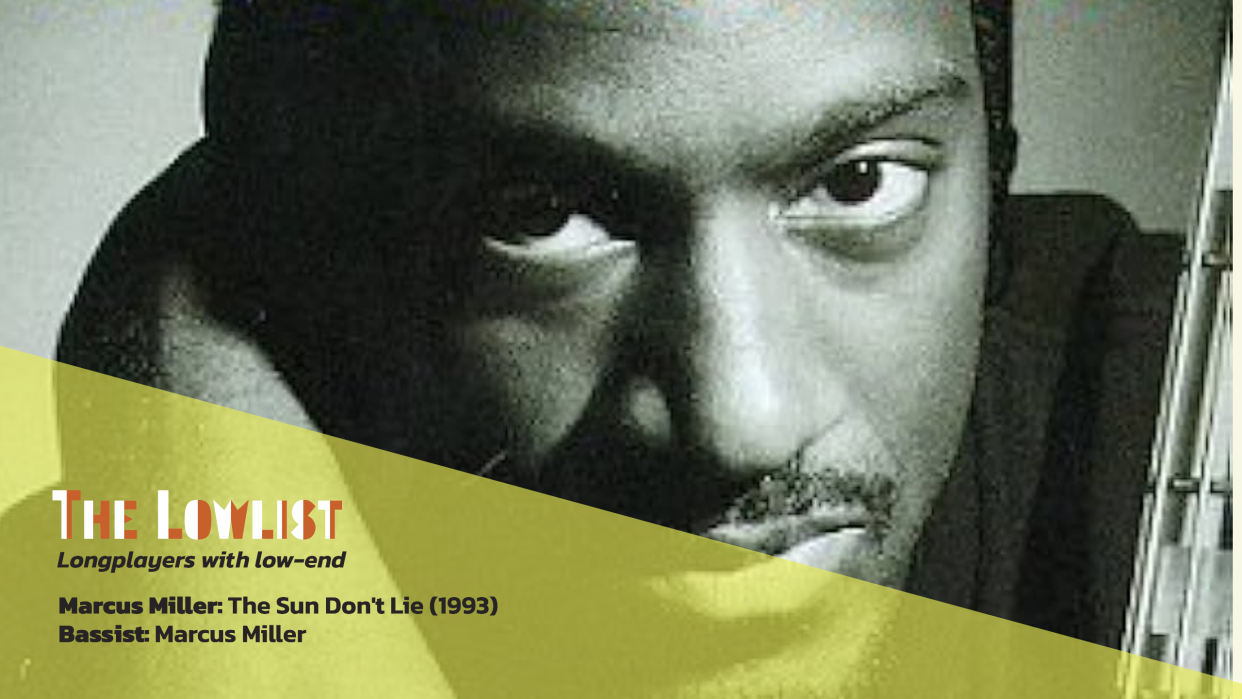Marcus Miller's The Sun Don't Lie: the moment Miller proved he was more than just a slap monster

- Oops!Something went wrong.Please try again later.
- Oops!Something went wrong.Please try again later.
Marcus Miller has had plenty of opportunities to grow musically. From sideman work with saxman David Sanborn to vocalist Luther Vandross to jazz legend Miles Davis –as well as producing his own vocal R&B albums – Miller had plenty of years to hone his soulful skills and develop his trademark tone. But 1993's The Sun Don't Lie marked the first time Marcus matured to the point of pushing himself to find and expose his own solo voice.
This broad collection of jazz-funk instrumentals certainly showcases Miller's hot thumb-thumping passages and quick fingerstyle licks. Yet, by sharing the spotlight with other great players– Miles, Sanborn, guitarist Vernon Reid, and others – Miller takes time to lay back in some badass grooves, showing that his sideman role of nailing it down is actually an integral part of his solo voice.
The album also marked the start of a series of albums which entwine and pull together the many and varied aspects of Miller’s musical tastes and influences – each album featuring an array of the great and the good from all musical genres. Alongside the likes of Wayne Shorter, Omar Hakim, Vernon Reid, and Lenny White, Miller created an album that opened the door to the next stage of his career.
Combining elements of R&B, soul, jazz, funk and a touch of rock in places, Miller brought to the table an album of many colours, all served up from an array of basses. His trusty ’77 Fender Jazz, which replaced his previous, stolen bass, covers most of the ground, but his Sadowsky and Fodera basses can also be heard, as can a Modulus fretless with its almost glass-like fretless tone. Around this time, Miller was heavily into SWR amplification, although he is also known as a player who likes to go direct to the desk. His basses were strung with DR Fat Beams steel strings (.045, .065, .080, .105), particularly on the fretted instruments, for a thick, crisp slap tone and a rounded fingerstyle tone with plenty of bite.
From the opening, melodic fingerstyle passage of Panther, you know you’re in for something special – and the opening track doesn’t disappoint, featuring a mix of fingerstyle melodies and slap grooves alongside some fine solos from Dean Brown and Marcus.
The bass solos incorporate several of Marcus’s signature phrases and playing techniques, including a root-octave slide at 5’20”. Steveland is a tip of the hat to Stevie Wonder and illustrates Miller’s use of the bass almost as a vocal instrument. In fact, he has often remarked that music is a language, and that bassists should build a vocabulary to communicate fluently via an instrument.
Rampage is a standard Miller funkathon and features plucked chords, strums and tight fingerstyle melodies in rapid succession. It also features some tasteful trumpet passages from the late Miles Davis. The title track is a mixture of fretless and fretted slap passages, the fretless tone bubbling along with a warm tonal character before switching over from 2’13”, underpinning the lively piano and steel drum accompaniment.
Scoop has become one of Miller’s signature slap pieces, with its instantly recognisable melody and the interweaving between the bass clarinet, alto saxophone and bass. Bent plucked notes give the bass solo fluidity and movement.
The first of two tributes to Jaco is the tapped version of Mr Pastorius, a sombre piece that contrasts favourably with Miller’s slapped cover of Jaco’s trademark number, Teen Town. Cleverly, Miller took a classic track, paid his respects and created a signature version of his own: at 3’23”, he takes the track off on a tangent with a funky fingerstyle groove on a five-string bass. Moons is another fretless tour de force, where Marcus capably proves that those who think he’s just a slap monster are very much mistaken.
Juju is an R&B/funk-pop workout that shows the more commercial side of Marcus’s playing, with the solo featuring some great envelope filter-effected tones. The King Is Gone is a tribute to Davis, who at the time of the album’s release, had passed away some 18 months earlier. The track is the most be-bop-fuelled track on the album and features Wayne Shorter on tenor and soprano saxophone. The great man’s death was clearly sorely felt.
This album stamped Marcus’s indelible footprint on the world of modern jazz.
The Sun Don't Lie is available to buy and stream.

